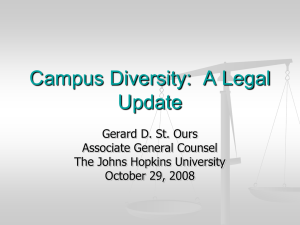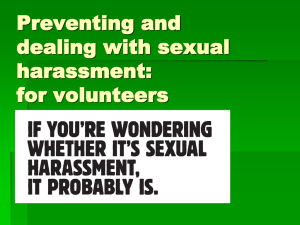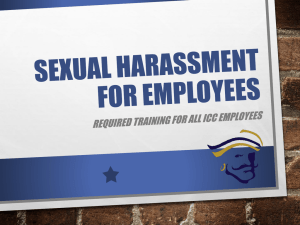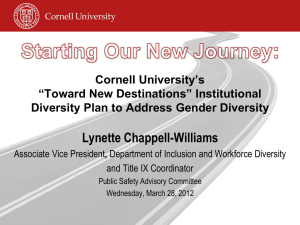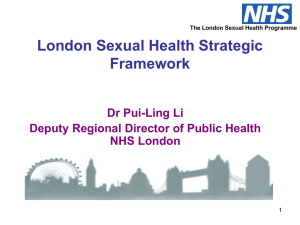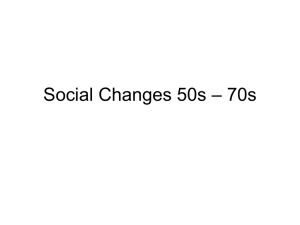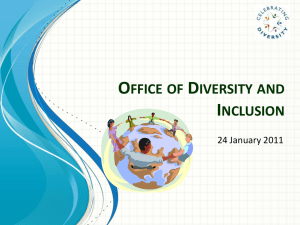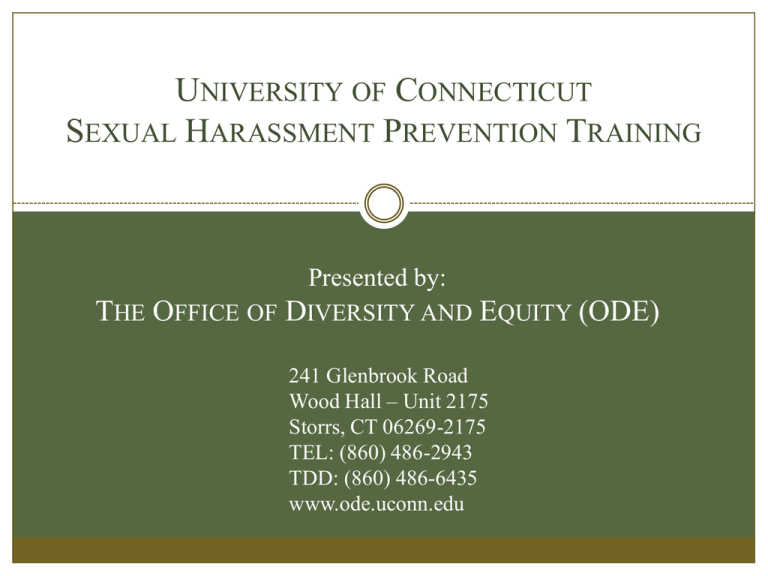
UNIVERSITY OF CONNECTICUT
SEXUAL HARASSMENT PREVENTION TRAINING
Presented by:
THE OFFICE OF DIVERSITY AND EQUITY (ODE)
241 Glenbrook Road
Wood Hall – Unit 2175
Storrs, CT 06269-2175
TEL: (860) 486-2943
TDD: (860) 486-6435
www.ode.uconn.edu
2
Training
Team
Al Lizana, J.D., Case Manager
Elizabeth Conklin, J.D., Interim Associate Vice
President & Title IX Coordinator
Kathleen Holgerson, Director, Women’s Center
Angela Rola, Dir., Asian American Cultural Center
Ann Randall, Paralegal and Legal Administrator
Peggy Hollister, Program Assistant
3
BASICS
Handouts – Going “Green”
Cell Phones/Blackberries
Laptops
Questions & Breaks
Late Entry/Early Exit
4
AGENDA
Why is this Workshop Important to Me?
Applicable Federal & State Laws
Applicable University Policy
Definition of Sexual Harassment
Conduct that May Constitute Sexual
Harassment
Consequences & Risks
Your Rights, Responsibilities & Obligations
Remedies Available
Reporting
5
WHY IS THIS
WORKSHOP
IMPORTANT ?
Because…
SEXUAL
HARASSMENT
IS
ILLEGAL
Training Mandated by
C.G.S. §46a-54(15)(B)
6
APPLICABLE
FEDERAL &
STATE LAWS
SEXUAL HARASSMENT IS PROHIBITED BY
Title VII of the Civil Rights Act of 1964, as
amended, 42 United States Code section 2000e
et. seq.
Title IX of the Education Amendments of 1972,
which prohibits discrimination based on sex in
education programs and activities that receive
federal financial assistance.
The State of Connecticut’s Discriminatory
Employment Practices Law, subdivision (8) of
subsection (a) of section 46a-60 of the
Connecticut General Statutes.
7
A worker tells a sexually explicit joke to a group of
IS THIS
SEXUAL
HARASSMENT?
co-workers including men and women (s/he is an
equal opportunity offender).
An employee receives a bad evaluation after s/he
turns down the sexual proposition of his/her
supervisor.
A female faculty member repeatedly offers to drive a
male student home after class. What if the female
faculty member offered to drive a female student
home?
I am a single faculty member and was asked out to
dinner by one of my students.
A supervisor of a 2-person unit repeatedly criticizes
the female employee’s work, while praising the male
employee’s work. Does it make a difference whether
the supervisor is a male or a female?
8
Definition of
Sexual
Harassment
“Sexual Harassment” means any unwelcome
sexual advances or requests for sexual favors or
any conduct of a sexual nature when:
(1) submission to such conduct is made either
explicitly or implicitly a term or condition of
an individual’s employment;
(2) submission to or rejection of such conduct
by any individual is used as the basis for
employment (or academic) decisions
affecting such individual (quid pro
quo/sexual favoritism); or
(3) such conduct has the purpose or effect of
substantially interfering with an individual’s
work performance or creating an intimidating,
hostile or offensive working (and
learning) environment.”
9
QUID PRO QUO
VS.
HOSTILE WORK
ENVIRONMENT
HISTORICALLY, THE COURTS
HAVE RECOGNIZED TWO TYPES
OF SEXUAL HARASSMENT:
QUID PRO QUO
Explicit or implicit exchange between a
supervisor and subordinate in which sexual
demands are a precondition for an
employment benefit, such as hiring,
promotion, or even retention of a job.
HOSTILE WORK ENVIRONMENT
Harassment that is both unwelcome and severe or
pervasive enough, to create an intimidating,
hostile, and objectively offensive working
environment.
10
POWER
RELATIONSHIPS
Faculty/Staff →→→→→Student
or
Supervisor→→→→→Employee
or
Faculty/Staff→→→→Faculty/Staff
(Addressed by ODE)
***********
Student→→→→→Student
(Addressed by Community Standards)
or
Student→→→→→Faculty/Staff
(Addressed by ODE and/or Community Standards)
11
APPLICABLE
UNIVERSITY
POLICY
UNIVERSITY’S POLICY
STATEMENT ON HARASSMENT
All forms of sexual harassment and
discrimination are considered serious
offenses by the University.
Such
behavior is particularly offensive when
power relationships are involved.
12
EXAMPLES
OF
SEXUAL
HARASSMENT
Unwelcome Sexual Advances
Suggestive or Lewd Remarks
Unwanted Hugs, Touches, Kisses
Requests for Sexual Favors
Retaliation for Complaining About
Sexual Harassment
Derogatory or Pornographic Posters,
Cartoons, Drawings, or Emails
Sexual Assault
13
MYTHS ABOUT
SEXUAL
HARASSMENT*
Myth
Most people enjoy sexual
attention at work and school.
Fact
Not necessarily. One person’s
teasing may be another’s sexual
harassment. Some people may
be angry, while others may be
embarrassed.
* Courtesy of the National Association of College and University Attorneys
14
MYTHS ABOUT
SEXUAL
HARASSMENT*
Myth
Harassment will stop if a person
just ignores it.
Fact
Harassers often believe that if a
person ignores harassing behavior,
s/he likes it. The lack of response is
seen as approval or encouragement.
Studies show that in most cases
when harassment is ignored, it
continues and often gets worse.
* Courtesy of the National Association of College and University Attorneys
15
MYTHS ABOUT
SEXUAL
HARASSMENT*
Myth
If females watched the way they
dressed, there would not be a
problem with sexual harassment.
Fact
Sexual harassment can happen to
anyone, no matter how they dress. It
typically has more to do with power
than with sexual attractiveness or
appearance.
A particular way of
dressing is not permission to touch or
otherwise harass.
* Courtesy of the National Association of College and University Attorneys
16
MYTHS ABOUT
SEXUAL
HARASSMENT*
Myth
Nice people could not possibly be
harassers.
Fact
Harassers generally do not fit any
particular mold. They come in all
forms, including well-liked and
talented, respected professionals.
* Courtesy of the National Association of College and University Attorneys
17
PRINCIPLES TO
REMEMBER
Silence cannot be construed as acceptance;
Context, body language, and tone of voice
are key factors to consider;
People generally appreciate well-intended
compliments; they do not want to be
degraded, abused, objectified, threatened or
singled out on the basis of their sexuality;
and
Gender and cultural differences will affect
perceptions.
18
DID YOU
KNOW?
VICTIMS AND HARASSERS CAN BELONG
TO THE SAME PROTECTED CLASS.
E.g., individuals of the same gender or
race/ ethnicity (etc.) can engage in
sexual harassment of each other.
THIRD PARTIES WHO OVERHEAR
COMMENTS OR WITNESS SEXUAL
HARASSMENT MAY ALSO FILE COMPLAINTS.
E.g., male employees can file claims
against other male employees who
were overheard making derogatory
remarks about women (hostile work
environment) and vice versa.
19
NEGATIVE
EFFECTS OF
SEXUAL
HARASSMENT
Affects overall work productivity
Contributes to poor performance
Causes interpersonal conflicts
Creates a hostile work environment
Adds to absenteeism/turnover
Leads to complaints/grievances
Let’s Take A Break!
21
CONSEQUENCES
&
RISKS
Individuals
who commit acts of sexual
harassment may face disciplinary action.
Disciplinary
Action may include: Verbal
Counseling, Letters of Warning, Suspension
& Termination.
Individuals
who commit acts of sexual
harassment may be subject to both civil and
criminal penalties.
Harassers can be held personally liable if
acting outside the scope of their employment.
22
YOUR
RESPONSIBILITIES
SUPERVISORY EMPLOYEE
EMPLOYEES WHO SUPERVISE OTHER
EMPLOYEES have a “heightened” duty
to receive and report allegations of
sexual harassment.
A SUPERVISOR’S FAILURE TO REPORT
incidents of sexual harassment violates
University Policies and may subject the
supervisory employee to disciplinary
action.
23
INSTITUTIONAL
LIABILITY UNDER
TITLE VII –
CO-WORKER
HARASSMENT
An employer is liable for proven co-worker
harassment if it knew or should have known
of the misconduct but failed to take prompt
and appropriate corrective action.
24
INSTITUTIONAL
LIABILITY UNDER
TITLE VII
The employer is automatically liable for
harassment by managers/supervisors when
the harassment culminates in a tangible
employment action.
A tangible employment action requires an
official act of the employer and in most cases,
inflicts direct economic harm.
Examples of Tangible Employment Action
Demotion
Denial of Promotion
Termination
Unfavorable Reassignment
25
INSTITUTIONAL
LIABILITY UNDER
TITLE VII
IF THE HARASSMENT DID NOT LEAD
TO
A
TANGIBLE
EMPLOYMENT
ACTION, THE EMPLOYER IS LIABLE
UNLESS IT PROVES THAT
(1) it exercised reasonable care to
prevent and promptly correct any
harassment; and
(2) the employee unreasonably failed
to complain to management or
otherwise failed to avoid harm.
26
NOW PLAYING…
“SEXUAL HARASSMENT
FOR EDUCATION”
COASTAL TRAINING TECHNOLOGIES CORP.
COPYRIGHT 1995
27
INSTITUTIONAL
LIABILITY UNDER
TITLE IX
When students are sexually harassed in the
learning environment, a college or university
will be liable if a higher-level official—who at
a minimum has authority to address the
harassment and institute corrective measures
on the school’s behalf—receives actual notice
of, and is deliberately indifferent to, it.
The U.S. Department of Education’s Office of
Civil Rights extends obligation to respond
beyond those who actually have authority to
address the harassment, but also to any
individual “who a student could reasonably
believe has this authority or responsibility.”
28
WHAT YOU
CAN DO
Speak with the offender directly as soon as the
harassment occurs. State clearly the behavior
that you want stopped.
If you cannot speak with the offender directly,
write a letter soon after behavior and present it
to the offender. The letter should contain: a
detailed account of the behavior; how you felt
about the behavior; and what steps should be
taken in the future to prevent reoccurrence.
Discuss the situation with someone you trust.
Contact one of the resources provided by the
University.
Report the harassment to a supervisor or
directly to DDE.
29
Retaliation against an individual for filing a
complaint
or
charge
of
discrimination,
participating in an investigation, or opposing
discrimination practices is prohibited.
An employer may not fire, demote, harass or
otherwise “retaliate” against an individual for
reporting or filing a charge of discrimination,
participating in a discrimination proceeding, or
otherwise opposing discrimination.
The standard for retaliation includes any action
that would dissuade a reasonable individual from
coming forward to report discrimination and/or to
participate in an internal/external investigation.
RETALIATION
30
EXAMPLES
OF
INAPPROPRIATE
RESPONSES
WHEN DISCUSSING POSSIBLE
SEXUAL HARASSMENT, PLEASE BE
CAREFUL NOT TO USE THESE
WORDS:
That’s how they do things where s/he comes from.
It’s just a joke. Lighten up.
We’ve never had a complaint before, so we don’t have
a problem now.
That kind of behavior is part of growing up.
It’s a matter of hormones. We can’t control that.
If we had to discipline every employee who uses
inappropriate language, we’d never get anything done.
It’s just a prank that got out of hand.
31
MORE
EXAMPLES
OF
INAPPROPRIATE
RESPONSES
WHEN DISCUSSING POSSIBLE SEXUAL
HARASSMENT, PLEASE BE CAREFUL
NOT TO USE THESE WORDS:
I know s/he did not mean anything like that.
It’s your fault for dressing so sexy.
You need to learn to handle these things.
Just ignore it.
S/he puts his arms around everyone.
Why can’t you learn to accept a compliment?
You must have wanted it, otherwise you would
have said “no.”
32
INTERNAL
REPORTING
Y
OFFICE OF DIVERSITY AND EQUITY
Claims by/against University employees
(860) 486-2943 – Case Management
DIVISION OF STUDENT AFFAIRS
COMMUNITY STANDARDS
Student-to-Student Claims
(860) 486-8402
UCONN POLICE DEPARTMENT
911 – emergencies
(860) 486-4800 (routine calls)
33
INTERNAL
REPORTING
WHAT TO EXPECT IF YOU FILE
AN INTERNAL COMPLAINT
All complaints are taken seriously.
Confidentiality
is maintained to the
extent possible by law and consistent with
adequate investigation.
Complaints are investigated promptly.
Retaliation, where established, will be
dealt with and result in disciplinary
action against the harasser.
Coverage is extended to applicants,
employees and third parties.
34
EXTERNAL
REPORTING
CONNECTICUT LAW
CONNECTICUT COMMISSION ON HUMAN
RIGHTS & OPPORTUNITIES (CCHRO)
21 Grand Street
Hartford, Connecticut 06106
(860) 541-3400 / (800) 477-5737
TTY: (860) 541-3459
State law requires that a formal written
complaint be filed with the CCHRO within
180 days of the date when the alleged
harassment occurred.
35
EXTERNAL
REPORTING
FEDERAL LAW
EQUAL EMPLOYMENT OPPORTUNITY
COMMISSION (EEOC)
John F. Kennedy Federal Building
475 Government Center
Boston, MA 02203
(617) 565-3200 / (800) 669-4000
TTY: (800) 669-6820
Federal law requires that a formal written
complaint be filed with the EEOC within
300 days of the date when the alleged
harassment occurred (must be filed
within 180 days to preserve state claims).
36
REMEDIES
AVAILABLE
(EXTERNAL REPORTING)
Cease and desist orders
Back pay
Front pay
Compensatory damages
Hiring, promotion or reinstatement
Attorney’s Fees (if Commission enforcing
federal anti-discrimination statutes)
Punitive Damages (§1983 Claims)
37
UNIVERSITY
RESOURCES
DEPARTMENT OF HUMAN RESOURCES
(860) 486-3034 (Main Line)
OFFICE OF AUDIT, COMPLIANCE & ETHICS
(860) 486-4526 (Main Line)
(888) 685-2637 (Hot Line)
EMPLOYEE ASSISTANCE PROGRAM (EAP)
(860) 679-2877 (Main Line)
(800) 852-4392 (Toll Free Number)
UNION REPRESENTATIVE
(IF APPLICABLE)
38
UNIVERSITY
RESOURCES
AFRICAN AMERICAN CULTURAL CENTER
(860) 486-3433
ASIAN AMERICAN CULTURAL CENTER
(860) 486-0830
PUERTO RICAN/LATIN AMERICAN
CULTURAL CENTER
(860) 486-1135
RAINBOW CENTER
(860) 486-5821
WOMEN’S CENTER
(860) 486-4738
39
Can
FREQUENTLY
ASKED
QUESTIONS
I file an anonymous or confidential
complaint?
What
if my supervisor is aware of the
harassment and does nothing, or my supervisor
is responsible for the harassment?
What should I do if the behavior only happened
once and there were no witnesses?
If the sexually harassing behavior occurs off-
site between two co-workers, does the
University’s Policy Statement on Harassment
apply?
What should I do if I am not sure whether the
behavior is sexual harassment?
Other Questions?
ZERO TOLERANCE!
40
A HARASSMENT-FREE
WORKPLACE & EDUCATIONAL
ENVIRONMENT
THE OFFICE OF DIVERSITY AND EQUITY (DDE)
241 Glenbrook Road,
Wood Hall – Unit 2175
Storrs, CT 06269-2175
Telephone: (860) 486-2943
www.ode.uconn.edu
PLEASE SIGN OUT

